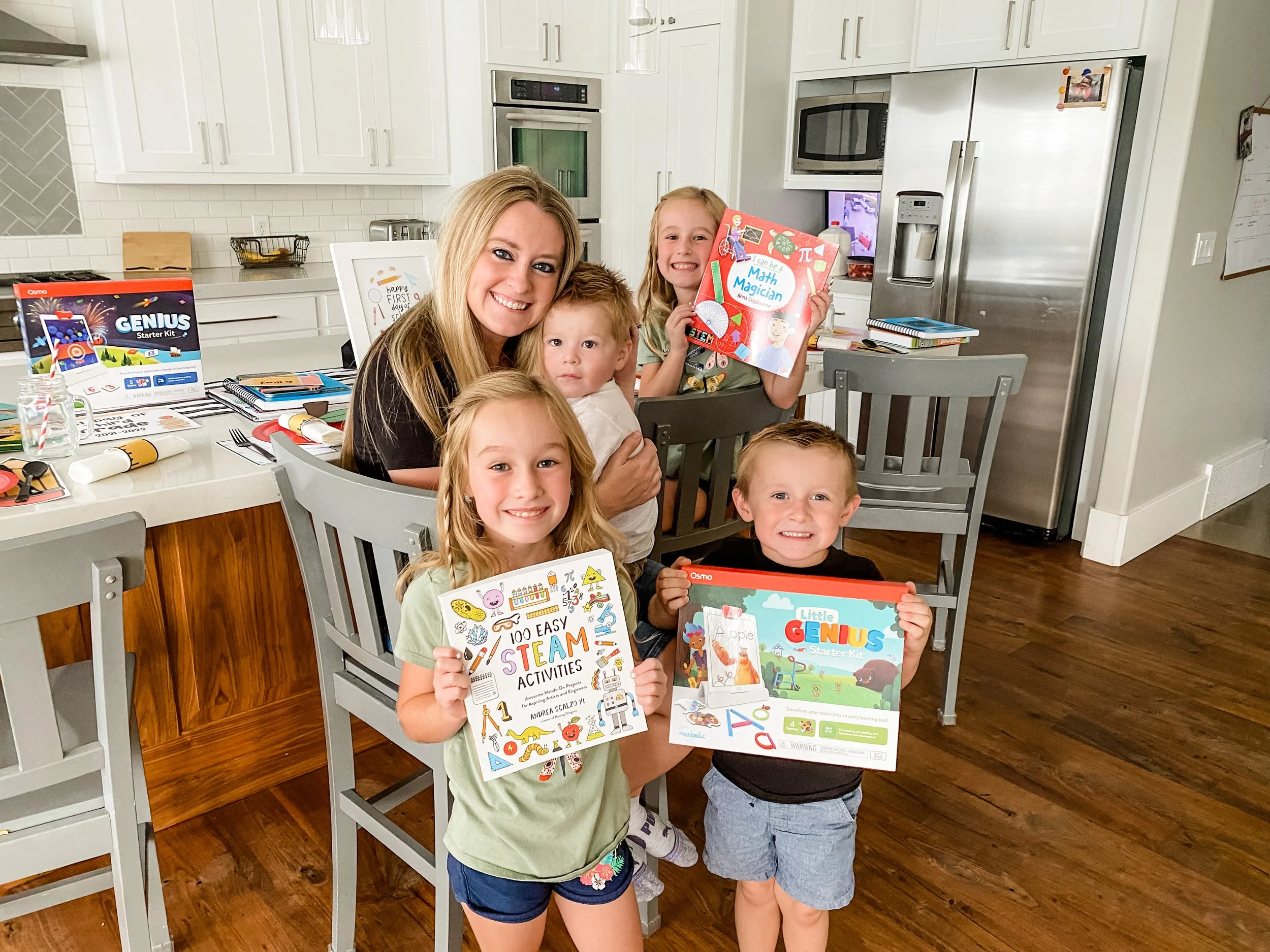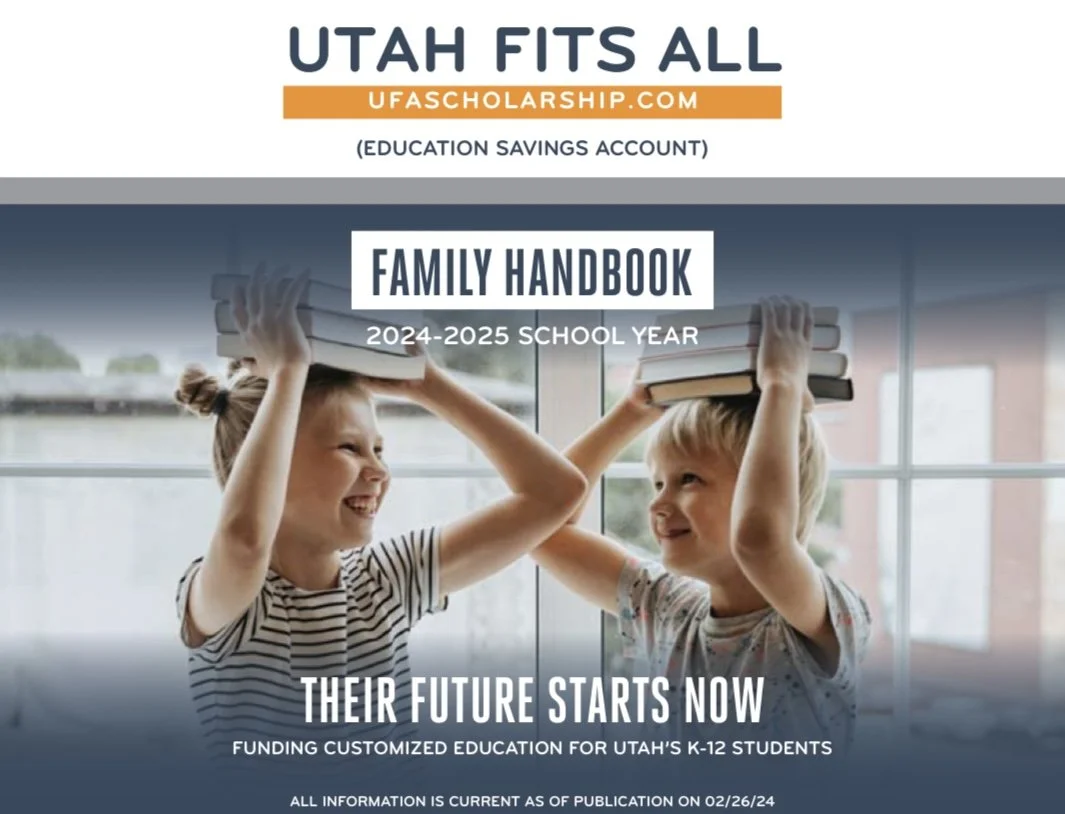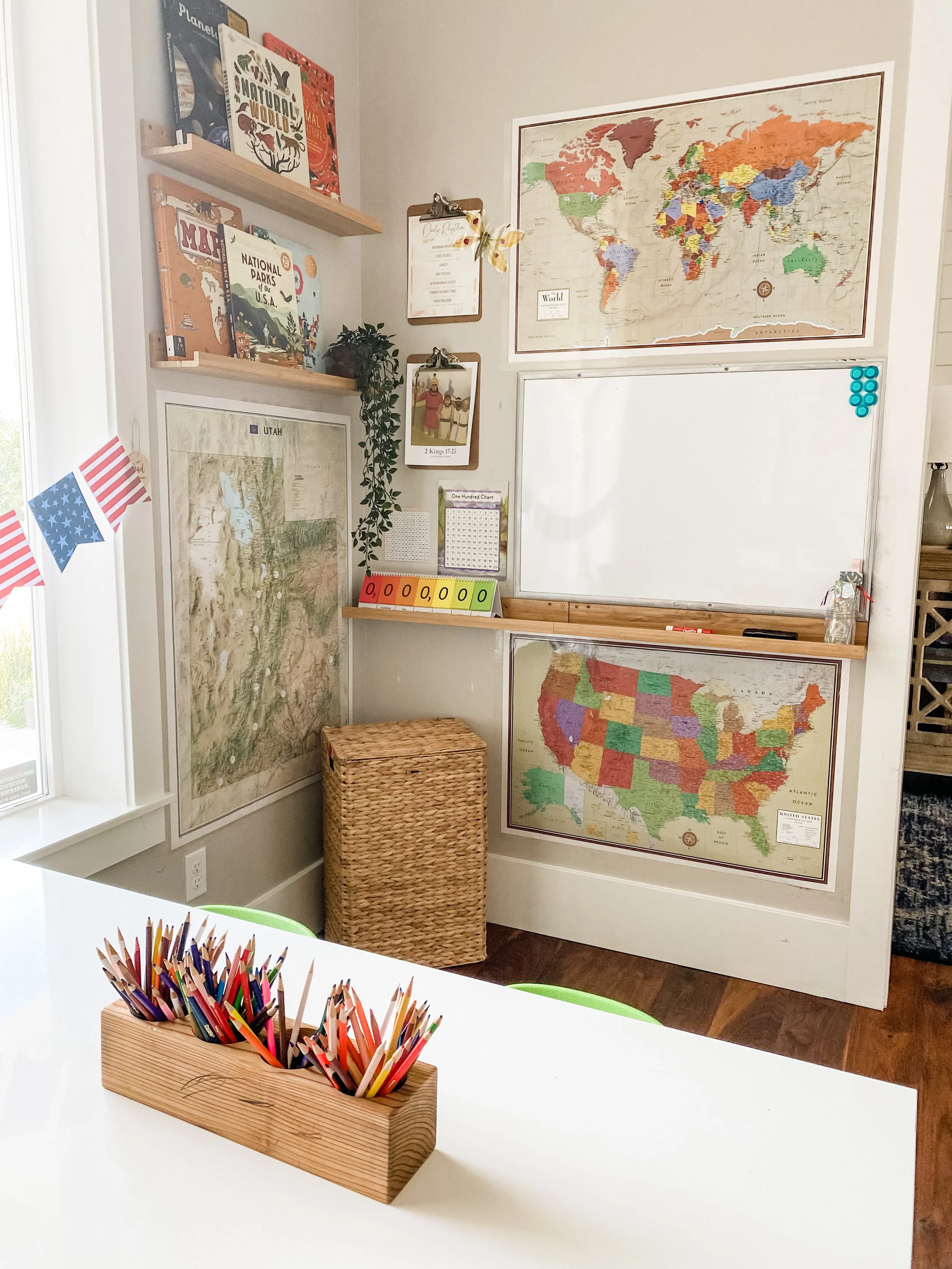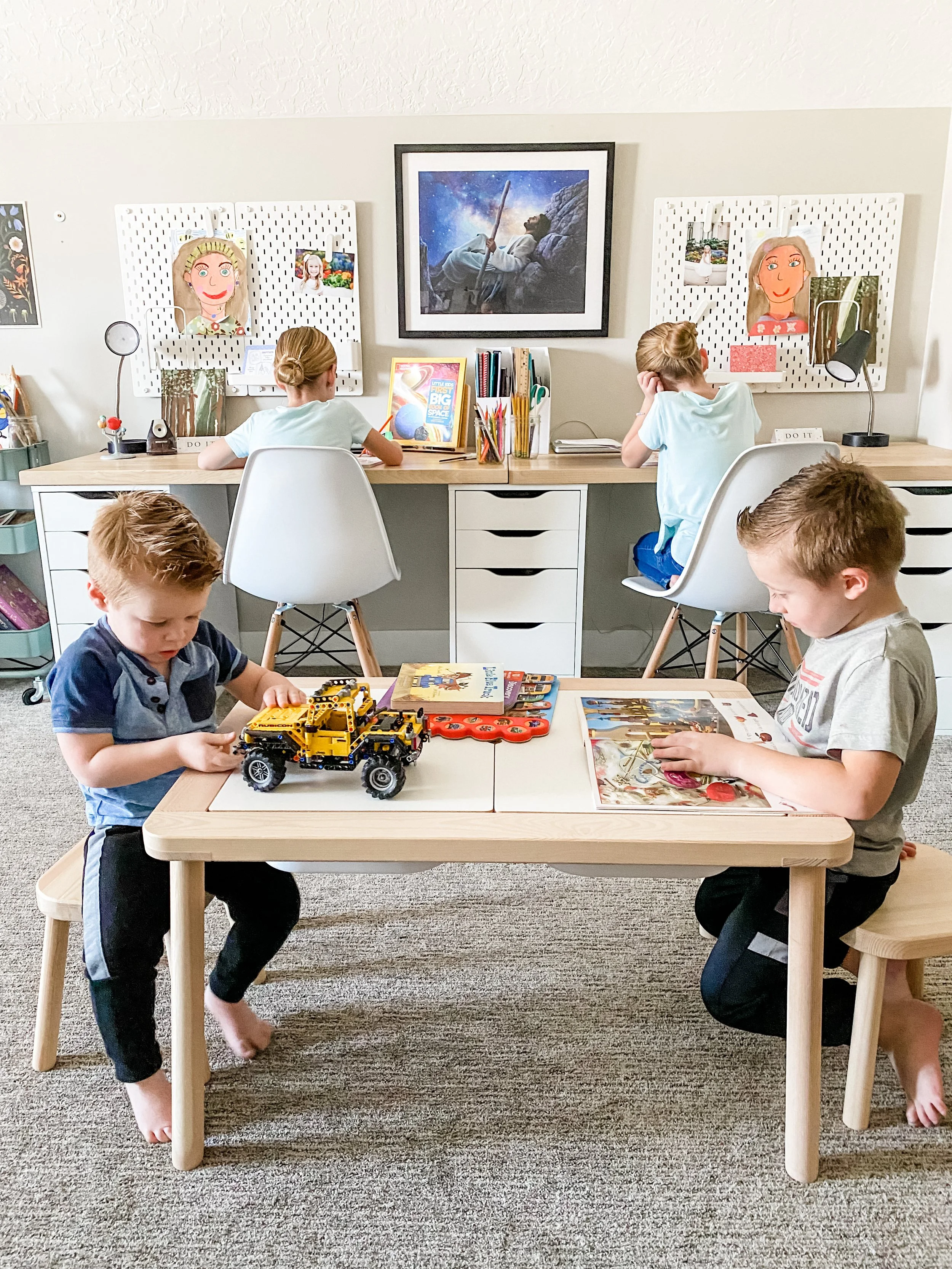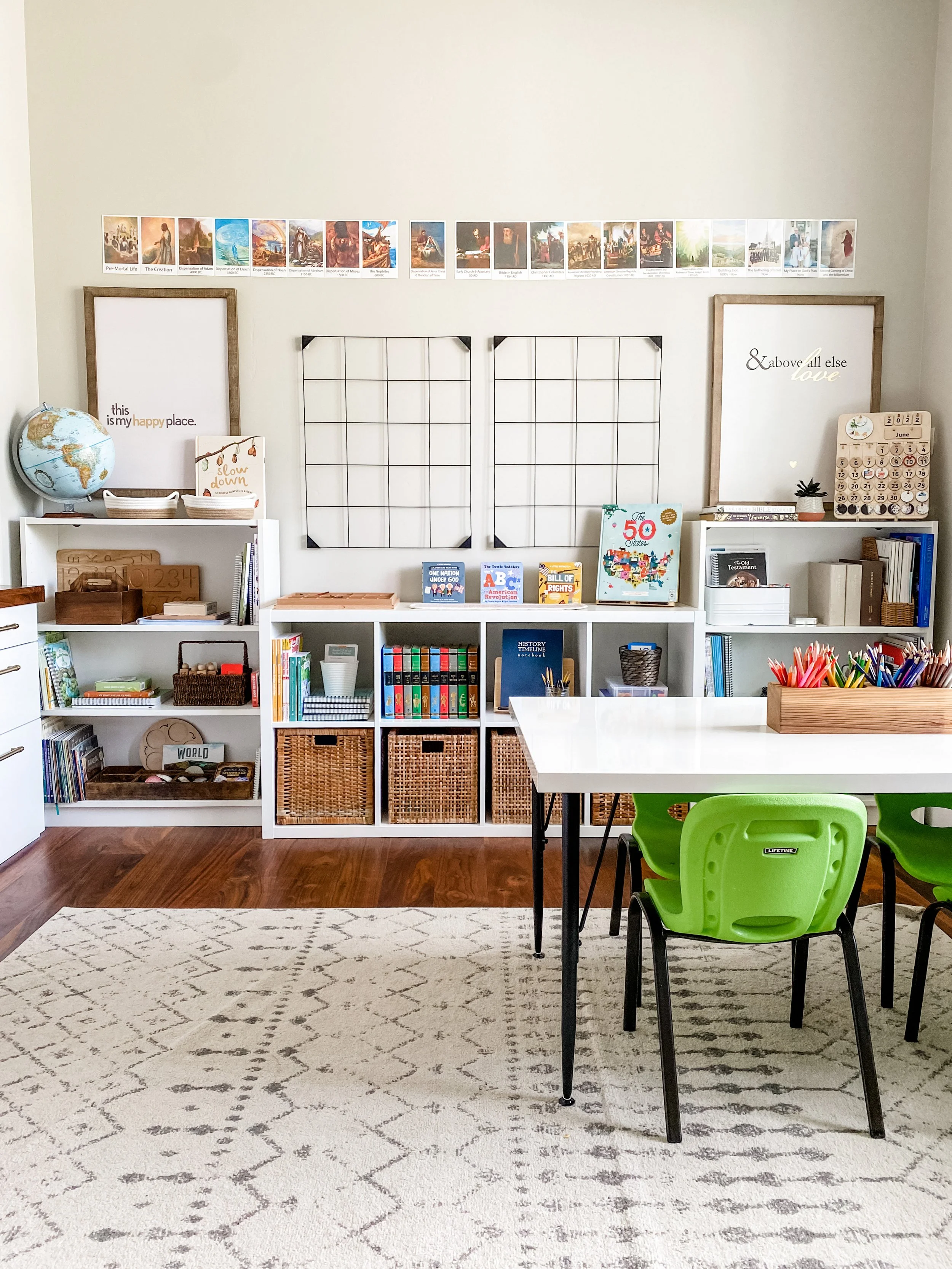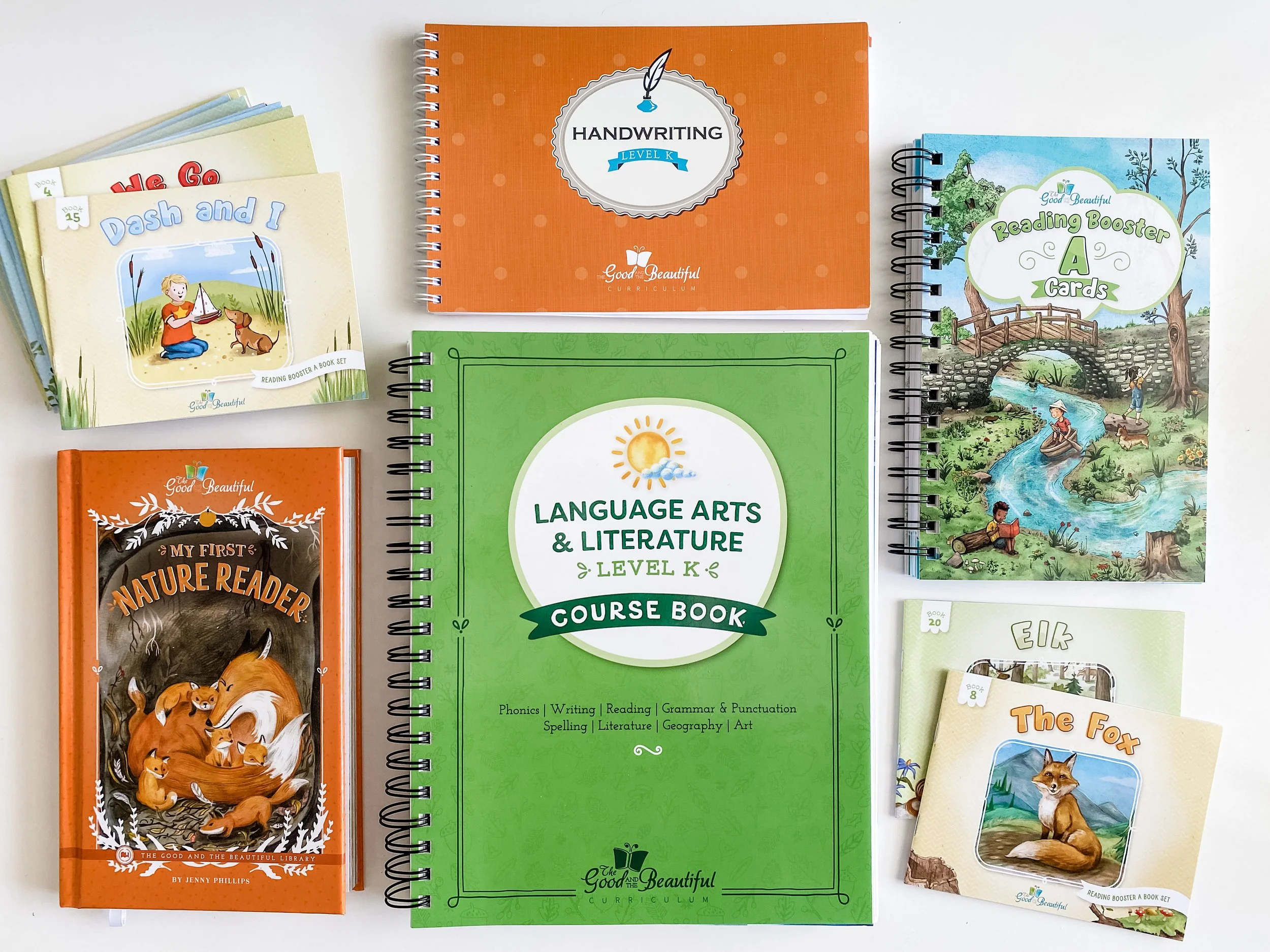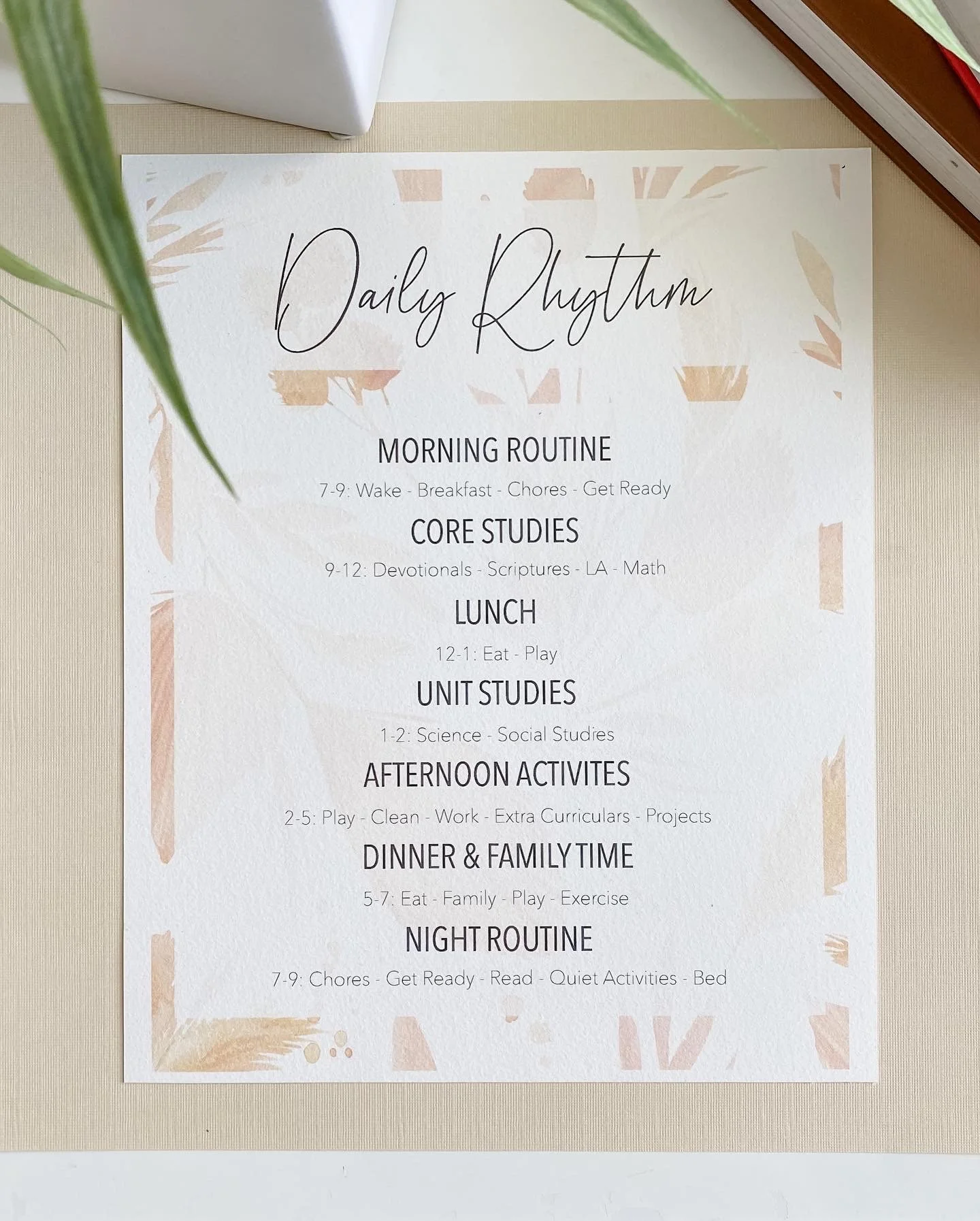Utah Education Fits All
On February 28, 2024 the application portal opened for the Utah Education Fits All Program (UFA). Every time I chat about this new program I get lots of questions so I thought it’d be best just to move questions and some of my personal thoughts over into a blog post. As a disclaimer - I have followed the evolution of this from the bill to law to actual program, but, like so many of us, I am learning right along side you so it’s always possible I’ve misunderstood something a long the way.
Homeschooling has been a huge blessing to our family and, really, it is my greater hope here to direct you to some of the places to learn more about what educational options are out there for the state of Utah. I also wanted to just share some of my personal insights and opinions because I know it can be helpful to hear other’s thoughts when something new is ahead of you.
What is Utah Education Fits All?
First, many Utah homeschoolers are already familiar with homeschool support programs like My Tech High and Harmony. If you aren’t familiar with these programs, essentially they have been designed to offer financial assistance to families who don’t use a traditional public school. We’ve been enrolled with My Tech High (MTH) since 2019 and each year we have received $1,625 per child to use toward their educational purposes. I have four children so in the coming 2024-2025 school year our family will receive $6,500. We’ve had a very positive experience with MTH. These funds can go toward educational supplies, curriculum, or even extra curricular activities like music or sports. If you want to know more specifically about MTH, you can read a blog post I wrote in 2021 about the program here.
So far, what I am seeing from the UFA program is, in my opinion, the next step up from programs like My Tech High. UFA’s primary mission is to, “ensure Utah families have the freedom and access to choose the best fit for their child’s education.” School choice has always been important to many Utah parents, but I would say especially since the events in 2020, we’ve seen a huge increase in parents becoming more aware and active in their children’s education. And, in doing so, many have sought and are still seeking alternative opportunities. In early 2023 parents and children gathered in support of the new school choice program called Utah Education Fits All and their voices were heard. So, UFA was signed into law.
Now, here in Utah parents can sign an affidavit and homeschool their children at any time. Especially compared to some states, we already have a lot of freedom for school choice. So, what’s the main draw of UFA and why should parents be applying? Well, for those families who apply and are selected into the program they will receive $8,000 a year per student to support their child’s education. Since this is the first year and funding is limited - I think most families will be in a lottery to receive the funds, but I do think eventually we’ll see the funds available to everyone. But, eventually, as a family with 4 children, with the UFA funding we’d receive $32,000 a year to use toward educational expenses for our kids.
These funds can be used for a variety of things including private school, micro schools, tutoring, sport programs, music education, on-line classes, subscription boxes, museum passes, and nearly all of the homeschool supplies you may want to bring directly into your home. Things like books, desks, laptops, tablets, bookshelves, printers, basic school supplies, educational friendly toys like legos, science projects, STEM activities, art supplies, all sorts of learning curriculums and programs. I have a general supply list of funding friendly items which you can browse here.
“But, what’s the catch?”
This is always the next question I get. Admittedly, it’s the question that I also first asked. As good citizens who value quality education and are in-tune with educational politics, we should be asking hard questions and looking at these type of programs with critical eyes. When we ask, “but, what’s the catch?” I think what we many are really saying here is - will involvement in these type of programs put our freedoms at risk?
I want you to know - I get it. I get that we have to have our eyes open and know what is going on. We will wind ourselves up in another educational disaster if we don’t. But, I think we need to change our mindset from “what’s the catch?” to “what should I know about this?” I think it is a good idea to spend a few hours and really educate ourselves on what options are out there. It does no one any good if you pick up a catch-phrase from me or from someone in a Facebook group or a headline in the news to form your decision on these types of programs. One of the biggest mistakes I see people make when it comes to the My Tech High program is quickly dismissing it and never taking the time to really learn about it. Now that I have a better grasp of what is coming for Utah via UFA and I also understand and have followed these programs in other states (like Arizona) - I really don’t think there is a “catch” we all need to be concerned about. Are there some regulations and things we need to thoroughly understand? Yes. But, ultimately, at the end of the day, maybe you view something as a “catch” that I don’t though.
Understanding the Law & UFA
If I could share just one thing with you guys is that it takes time to wrap your head around something new and I think it’s crucial that we do. On one hand, please don’t just blindly follow. When it comes to educational funding - these funds are valuable and it’s important that we understand where they’re coming from and how to best use them so that we can be responsible with them. On the other hand, please don’t just dismiss these programs as too complicated to figure out. It’s easy to do what’s always been done…like walk across the street and enroll your child in your neighborhood public school. But, for education to change and evolve, it takes time to learn about the new opportunities that are arising. The first step in doing this is doing your research.
Here are some of the things I suggest for others to do to learn more about UFA:
First, if you’re just getting started and you enjoy the legal talk - you can read the original bill for itself here. From this page you can view the senate hearings and debates about it. You can hear “both sides” and form your own opinions on whether or not school choice programs should exist. Personally, I really enjoyed watching the hearings. In early 2023 lots of parents and families and even children showed up to testify on why having more choices in education matters. I heard some perspectives I hadn’t thought of before and overall it was just really good.
Another thing you may find interesting is reading the law that was put into effect in May of 2023. It gives lots of details. A lot.
However, probably the most relevant to today and easiest to understand as a basic introduction to the program is to simply read over the FAQ’s listed right on the UEFA website. This will probably answer all the questions that first come to mind when you learn that there are other educational pathways available.
Next, UFA recently released their Family Handbook which goes over the program thoroughly and is very very helpful and will probably answer any additional questions you have after reading through the FAQs.
You can apply for the program here. The application portal is only open until April 15, 2024. It’ll close and enrollment applications won’t be accepted again until 2025.
Finally, I know a lot have been curious about the providers and that list has been released here - eligible school and provider list. As someone who is very familiar with the homeschool world - I see a lot of well known and even lesser known curriculum and education providers already approved. Personally, I think it’s a great list with lots of options. And, the way that it’s worded the handbook and website makes it sound like if there is a provider you’d like to get added - there is a simple process to do so. If you’re new to homeschool- just browsing this list will really open your eyes to just how many options are out there.
My Personal Thoughts & FAQs
I can’t emphasize enough that I hope you do your own research on what is changing in Utah. But, I also understand it’s helpful to hear others thoughts. I’ve followed UFA for a while now and I have developed my own opinions and here are some of those thoughts to some personal FAQs I’ve gotten. Also, remember, I’m learning too so it’s entirely possible I’ll change my mind down the road, but for right now this is where I am at…
Will you apply for UFA? Yes. It is a difference of $6,500 versus $32,000 a year for our family. To us, that is a substantial difference. I want to make it clear that I don’t think it’s necessary to have funds like this to homeschool, but I sure think it’s helpful. I’m also looking ahead and think funding like this really opens doors in the high school years. I’ve already started researching high school pathways and while it can be done cheaply - there are also some pretty pricy high school courses.
Also know, I think it should be known and expected that there will be some bumps in the road especially as UFA rolls outs. We shouldn’t expect this program to be perfect. There is always give and take. But, so far, I’ve been very impressed with their implementation of the beginning phases of the program. They’ve done a great job with communication and clearly stating what we can expect to see in the coming days.
What about My Tech High? There will be more applicants than funding available for UFA in the 2024-2025 school year. Funding priority is given in certain tiers (which you can read about in the FAQs or handbook). We will likely be in the lottery so I suspect we will continue with My Tech High next year. We’ve loved MTH so we will declare our intent to re-enroll with them and if we get the funding then I will un-enroll my kids from My Tech High when I know for sure we have the UFA funding. Either way, I am still very grateful for MTH and think it’s a great program. If you decide UFA isn’t for you or you don’t get the funds, MTH is still a fantastic option.
Will programs like MTH dissolve because of UFA? I don’t know, but for right now I would assume not. I assume this because Arizona’s ESA program (a similar program to Utah’s UFA) is open and available to everyone and Tech Trep, a sister school of MTH, is still operating in AZ. If it does dissolve, it will probably be because UFA is a superior program and the demand for MTH will go down. I think having educational competitors is a good thing. It challenges other programs and schools (including private and public schools) to up their game and be better.
What if the 2024-2025 school year is my first year homeschooling? UFA or MTH? If I were you, I would first apply to UFA right now since the application deadline is approaching. You have until July 15th to apply to MTH. Because you’ll know the status of your application after April 18, you’ll be able to make a better decision anyway. If you get the UFA - no need to apply for MTH. Or you can always decline it if you decide to go another route.
If you’re put on the wait list (and we should be able to see our place on the wait list) then I would still apply to MTH as soon as you know you’re on the UFA wait list. If you are accepted on the UFA waitlist then you can easily un-enroll from MTH. In the almost 5 years I’ve been with MTH - I’ve never heard of someone being rejected from MTH - assuming they applied within the application deadlines. So, you’ve got time to explore both options.
What kind of oversight will we see with UFA? This is a big question that everyone has been asking since it was put into law. There are two main things in relation to oversight. When families receive the funds: 1) children must participate in yearly state testing OR 2) parents can opt to show a yearly portfolio. Quite frankly, compared to other states, this is still pretty mild regulation so these things develop really didn’t bother me. In regards to state testing there is not a required assessment “bar” so to speak that your child has to pass to continue to get funding. That would be equivalent to kicking your child out of public school because they didn’t score high enough on a standardized test which is not going to happen. Also, tests completed in other schools (ie private) will also be accepted. From what I’ve seen, it looks like the portfolio will be done on a digital platform hosted by Unrulr. It is something you can make private or public and share with others. It has a social media IG type of vibe.
My guess is most people will probably do private portfolios. This is a generalized statement, but most homeschool families don’t like to make their kids sit through hours of unnecessary testing and many of us are adamantly opposed to regulated testing anyway. However, the alternative takes some forethought and more recording on the parents end though so it’ll just be a personal preference. If or when we receive the UFA funds, we’ll most likely do the portfolio. I have no problem with showing a little accountability.
And, remember, you don’t have to use the UFA funding so if you don’t want any of this oversight, as simple as it probably is, you can just sign your affifdavit and keep doing your own thing. This was a very important part of the law that was maintained when the bill was being debated. Those who utilize the UFA funding in Utah are categorized as a new type of student and just legally speaking “homeschoolers” who don’t use UFA will not at all be effected.
For the record here though - we’ve been using homeschool funding through My Tech High for almost 5 years now and have had no issues. Sure, I have some little complaints about clerical things the program does, but, I’ve always chalked it up to low-budget issues. Really, we’ve had a great experience with it. Further, I have never felt like it’s been “too regulated” and nearly everyone I know has been very grateful for the supportive funding and I think people need to hear these stories so they know other options are out there and they’ve had a good experience.
What are your thoughts on the lottery system? Some people have said this program shouldn’t have been created if it just ends up being a lottery or that students shouldn’t have been awarded so much funding so more kids would have the opportunity for the funds. I think there are some things we could look at from a broader perspective.
First, priority goes to low income families. This is just one of the things that had to happen to get the bill to pass. I hope these funds provide more opportunities for those who really do need it. And, even more, I hope people who fall into the first priority bracket are responsible and wise with the funds. Having been in the situation where I felt like I wanted something different for my children, but felt helpless - like my only option was public or charter schooling - I just know how hopeful I was to discover that they actually weren’t my only options and I actually had a lot more influence over my children’s education than I had originally realized. So, I just think in this sense we’re headed in the right direction.
I also don’t think we should expect the legislature to just drop millions of tax payer dollars into a brand new program suddenly available to everyone. When the bill was first passed, the program was given $40 million which would create about 5000 scholarships available - which, really, isn’t a lot. But, a year later, UFA was able to go back to the legislature and ask for more funding. UFA showed demand based on the pre-application process and asked for additional funding. Another $40 million was just granted so now 10,000 scholarships will be available for the upcoming 2024-2025 school year. UFA wanted more funding and could prove there was enough demand, but they just got too much push-back. So, for now, we have to focus on that the funding for the program has been doubled and the program hasn’t even started yet! So, overall, I think that’s a great first step. These type of things just take time to develop and that’s not a bad thing. There are a lot of moving parts.
Eventually, it is my hope that as parents stay involved and informed and show demand (and responsibility with the funds) that more and more funding will become available — even to the point that the lottery system will dissolve. I believe that is what UFA is ultimately hoping for too when they say “it’s for every child, in every zip code, from every financial background and every learning style.”
Another thing to note here is that in 2023 the average public school child cost $10,000 a year. So, the $8,000 per child a year is coming based off of these stats. I have 4 children who don’t use the public school system, but the public school system is still getting a chunk of my (and yours) tax payer money to pay for everyone else’s education. So, I have no problem receiving a portion of the funds back as if my child was actually utilizing the system.
I will take this opportunity to say though - I do think we should continue to be aware and pro-active and know what is going on in our states in regards to education. I absolutely think there will be other controversial bills and oppositions to school choice especially now that there are new laws in place.
Do you really think the funds will eventually be available to everyone? Yes, as long as we continue to show interest and support for UFA. In other states, like Arizona and Florida, initially limited funding for similar programs was available. Several years into the development of these programs, they now have enough funding to award to everyone who applies. I think Utah will follow suite. It’ll just take time and pro-active work.
Should I take the time to apply for UFA even if I don’t think I’ll get the funding this year? I think it’s worth it. We are applying for the scholarship even though it is likely we won’t receive the funding. If you believe in the mission behind UFA, I think it is our responsibility to apply so UFA can continue to show proof in application numbers that Utah parents want to see other educational options. Ultimately this will lead to more funding which will lead to more people receiving the funds.
Will we have to report this income on taxes? No. Financially speaking, it’s really no different than if your child was enrolled in your local public school. You’re just getting access to the funds instead of the school. Plus, this would really complicate the application process with how it’s set up.
Can I use the funds if I have a child in public school? Yes. But, I believe only if your child attends school part-time. Then you’re awarded $4,000 instead of $8,000. This would be a good option for someone who maybe perhaps wants to keep their child enrolled in a public school for core curriculum - like math and english and then take them out to pursue other interests like sports or music or dance. Or, some families may simply prefer to have less public or outside influence and find a mix of both public and homeschool a happy medium. For junior high/high school kids one option might be attending public school on A days and at-home classes or private interest-based or career training classes on B days.
What is the best way to spend the funds? For those of us who have already followed this law closely - this is probably the biggest question. I know for me, someone who is already pretty set in the basic supply and book lists, it has me questioning - would I ever use this type of funding for private schooling? Tutoring? A mico-school? What else is out there?
If you’re new to homeschooling and know you want to use the funds in your home you’re going to want to just look at getting the basic supplies - you’ll be looking at things like books, curriculums, basic supplies, a printer, maybe a binding machine, museum passes, etc. Here are some of the things I recommend.
When I asked on IG what people in other states use the majority of their funding on - it seems to go to more speciality classes or courses. Things like professional dance classes, private music lessons, training for sports and other athletic classes. There were also a lot of opportunities for other enrichment and interest based classes - things like cooking, sewing, art, pottery, STEM, wood work, horseback riding, and outdoor clubs. A few shared that they had private tutoring set up or were involved in common wealths or co-ops that had fees. A lot also used on-line classes.
For us, personally, I don’t see us using the funds at this point toward private schooling. We are set homeschooling and absolutely love it and I don’t see that changing unless by divine revelation. Any type of micro-school or co-op class would have to be amazing for me to commit to — like really amazing. I think we will see more of these opportunities pop up in the next 5-10 years, but right now - there isn’t anything more formal I’ve found that interests us. Plus, for us, one of the reasons we homeschool is to have more time and flexibility as a family so I have learned to be careful to what I commit to.
However, in addition to our basic supplies and curriculums, I do hope that if or when we receive the funds we could use them to help our children explore more of their interests and develop career readiness this way versus being stuck in unrelated subject classrooms all day. What I am really hoping for here in Utah is that we’ll see more private mentorship opportunities pop up. A good example of this would be a program like Wilderness Survival School. This is a crew who are passionate about what they do and are turning around and teaching others now. We aren’t necessarily interested in wilderness survival right now (though, I think eventually my boys would LOVE something like this) - but it’s these types of programs/schools/classes/leaders we can surround our kids with to support the development of who they truly are. Plus, this also helps supports small passionate businesses and the entrepreneurial spirit in their missions. I would love to see more trained educators leave their low paying education jobs and establish solid tutoring businesses that would be easier for us to support with this funding. Further - we also love to travel so travel costs to places like museums and educational activities along the way in other states is something we’d enjoy using the funds on. In the future, as I stated, I can see us utilizing more on-line classes as well.
What is similar/different in the funding compared to MTH? The biggest difference I see, so far, is that streaming services like Disney+, Netflix, Hulu and the internet will not be covered. However, I think a better trade off anyway is that funds can now be used on faith based curriculum or schools - so you could us the funds for a private religious school or on curriculum like The Good and The Beautiful. Furniture is also something different - things like desks, chairs, and bookshelves can now be paid for with the UFA funds. With MTH if you don’t stay with the program for at least 3 years - you have to pay the funds back for items like tablets and computers. I don’t see that stipulation with UFA - only that you can only purchase a new computer or furniture once every 3 years.
With MTH we have only ever used the reimbursement process, but others can also have MTH directly pay for items they need. In contrast, it sounds like with UFA there will be an educational savings account in which your money is deposited into and you’ll be able to purchase or pay for educational supplies directly from that account. This is where that pre-approved provider list is also handy to be familiar with.
There was also some confusion on annual passes to museums like Thanksgiving Point and National Park and state passes and it looks like those are on the approval list now.
What about other states? UFA is only available in Utah, but there are other states with similar programs. From my understanding, Arizona, Iowa, Florida, and Alaska have somewhat similar programs. I am also aware that other states like Oregon, California, Idaho, Tennessee, Wyoming, and Indiana have smaller programs or charter schools that provide funding. I always tell people the best way to find out if your state has funding opportunities is usually via word of mouth. Get online in homeschool FB groups and ask lots of questions. I’ve found even google searches can come up short on what’s truly available out there.
Also, if you’re not a Utah resident, I do encourage others to know and understand programs that are available in other states because once upon a time these programs weren’t here. Many before us here in Utah and many in other states have worked very hard to make homeschooling possible. In some states, homeschooling is still very heavily regulated and in other countries - it isn’t even an option. HSLDA is a great resource to learn more about all the legal things pertaining to each state and homeschooling.
Final Thoughts
I will never forget when we pulled our kids from public school and just how grateful I was for a neighbor who spent hours helping me understand funding programs and what options we had available to us. Over the last few years, I’ve done similar things and mentored hundreds of parents through similar options. And, I always tell them to just simply pay it forward and support someone else when they come asking questions. So, I hope this post was helpful for you or that it can be something you pass along to help a family who is searching for something different when it comes to their child’s education.
Other Posts You May Like

